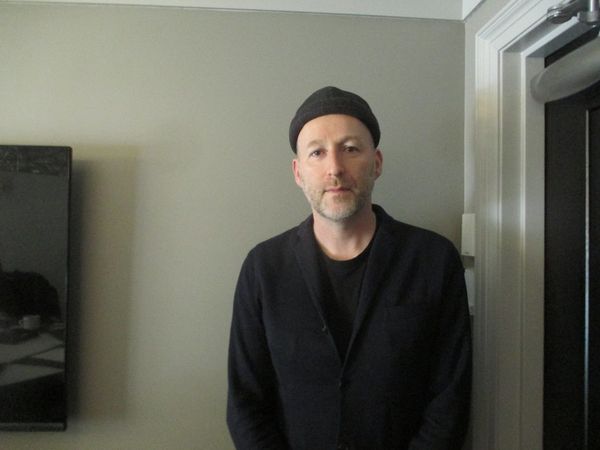Before the uniFrance and Film Society of Lincoln Center luncheon for the 24th edition of Rendez-Vous with French Cinema in New York - attended by the President of uniFrance Serge Toubiana and Executive Director of uniFrance Isabelle Giordano, Russell Banks, uniFrance’s American ambassador, Sophie Fillières, Agathe Bonitzer, Hélène Fillières, Emmanuel Mouret, Eva Husson, Pierre Salvadori, and Pio Marmaï - Amanda director/screenwriter Mikhaël Hers joined me for a conversation. We spoke about the roles of Vincent Lacoste, Isaure Multrier, Stacy Martin, Marianne Basler, Ophélia Kolb, and Greta Scacchi, dancing to Elvis Presley, film critic Serge Daney's book L'Amateur De Tennis and Mikhaël's love of tennis.
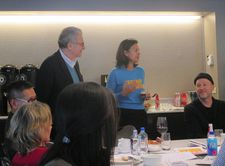 |
| President of uniFrance, Serge Toubiana and Executive Director of uniFrance, Isabelle Giordano with Mikhaël Hers at Rendez-Vous With French Cinema Photo: Anne-Katrin Titze |
David Sorel (Vincent Lacoste), a young man who hasn't made up his mind what to do with his life when we meet him, finds himself more involved with caring for his little 7-year-old niece Amanda (Isaure Multrier) than he planned for. When he is late for a picnic with his sister Maud (Ophélia Kolb) and friends, including Léna (Stacy Martin) who is new in town and lives across the courtyard from him, the world is turned upside down.
Shared activities and truly being in the moment bond Amanda and David. During a scene on Hempstead Heath, the great Greta Scacchi (as Alison) joins them and with a smile, all age differences disappear. Amanda is allowed to be a real kid, a rarity in cinema, and her dance to Elvis Presley's Don't Be Cruel even made me think of the pinnacle of children amusing themselves through dance: Ana Torrent in Carlos Saura's Cría cuervos.
Anne-Katrin Titze: My first question is - What do you eat first? What you like best or what you like least?
Mikhaël Hers: Ha! I eat first what I like least.
AKT: And is that also what Amanda says?
MH: Yes, I think so.
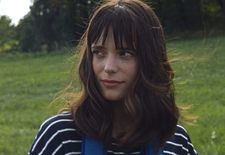 |
| Mikhaël Hers on Stacy Martin as Léna with Vincent Lacoste's David: "I thought that the combination was interesting." Photo: UniFrance |
AKT: The actress who plays Amanda [Isaure Multrier] is a wonderful find. I loved the interactions between Vincent Lacoste and her. Especially when they are on the bicycle together, there's wonderful chemistry. Did you do chemistry reads with them? How did you choose them?
MH: First I picked Vincent Lacoste. Since the film is quite dramatic, I needed someone who had that graciousness and that lightness to carry on. Then we cast the little girl. We looked at over a hundred little girls. I wanted a girl who had a little doll aspect as well as a girl who would be able to understand and carry the film. As far as chemistry is concerned, Vincent Lacoste doesn't have children that age around him, so it was difficult at the beginning.
AKT: The clumsiness works, though.
MH: As the film advanced, the complicity built up. So as the story developed, their relationship during shooting developed as well.
AKT: It feels very real what we see on their faces. When we first see what happened through the eyes of Vincent arriving at the park - at first it looks fake. It could be a film shoot or something else that is staged. That is again very real when something so drastic and unexpected happens. I remember being in New York on 9/11and seeing the towers burn. The first thought is - this is fiction. You really captured in your film the disbelief.
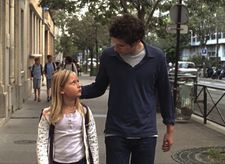 |
| Amanda (Isaure Multrier) with her uncle David (Vincent Lacoste): "As the film advanced, the complicity built up." |
MH: Yes, it was exactly that. Everything is seen through the glance of Vincent [as David]. There are two dimensions. Something that is very raw, very real and at the same time we need to protect ourselves. And, as you said about 9/11, we need to protect ourselves by seeing it like a fiction. The two dimensions coexist, it's very real and fake at the same time.
AKT: The attacks in Paris were also on your mind, clearly.
MH: Yeah.
AKT: The moment when Amanda is so adamant about wanting her mother's [Maud Sorel, played by Ophélia Kolb] toothbrush in its place, that reminded me of something Joan Didion wrote in The Year of Magical Thinking.
MH: Oh?
AKT: She describes that after her husband died, she couldn't get rid of certain things, his winter coat, for instance, because he would need it when he comes back. Is that it for the girl?
MH: I don't have that reference, but yes, that's it. Like a magical thought. When she goes up the stairs and she opens the door to the apartment, she expects her mother to be there. And of course she's not. It's the same kind of process.
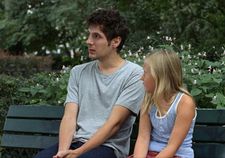 |
| Mikhaël Hers on Vincent Lacoste and Isaure Multrier: "I needed someone who had that graciousness and that lightness to carry on. I wanted a girl who had a little doll aspect …" Photo: UniFrance |
AKT: I liked how you introduced the aunt [Sandrine Sorel, played by Marianne Basler] by way of the rabbit. The rabbit without a name. That tells the audience already a lot about her. She has a rabbit that she lets run out to the staircase and that she never bothered to name. How did you get the idea to introduce someone to us that way?
MH: I'm not sure I understand.
AKT: In other words, she doesn't seem to be the best person to raise a child. If she has a rabbit and doesn't even bother to give it a name?
MH: Yes, that's for sure. She's reassuring but at the same time a marginal presence, that aunt. It's obvious that it's not that aunt who is going to take care of the little girl.
AKT: It's always great to see Greta Scacchi on the screen. The last time I saw her was in a film [Operation Finale, directed by Chris Weitz] where she played the wife of Adolf Eichmann, opposite Ben Kingsley.
MH: I was a fan of her films in the Eighties and Nineties and I needed an actress who spoke both French and English. She has something very powerful, she stayed very beautiful and at the same time there's nothing mystified about her presence.
AKT: The beauty in the everyday comes out strongly in your film. Simply riding a bike through the city - how wonderful the every-day is. Even before the act that changes everything. Was that what you wanted to convey?
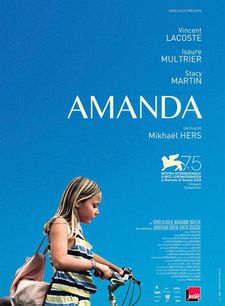 |
| Amanda French poster - World Première at the Venice Film Festival |
MH: Yes, that's what I tried to do. I tried to make daily-life things beautiful and poetic.
AKT: Also very poetic is the town mouse and the country mouse comparison for your couple.
MH: Vincent Lacoste is naturally very intuitive and Stacy Martin [as Léna], maybe due to her double nationality, is more cerebral, more rational as an actor. And I thought that the combination was interesting.
AKT: What I also found interesting was the scene at the orphanage. It seemed almost dreamlike.
MH: The place with the orphans?
AKT: Yes. Is this a real place or did you invent the location?
MH: It's a real place. I didn't want a place that looked like a caricature of an orphanage. It's also placed that it has a view over Paris, but it is a real orphanage.
AKT: Tennis! Tennis is always a good choice for cinema. Hitchcock knew this, too. Why Wimbledon? Is there more to it?
MH: I adore tennis. And Wimbledon is, of course … Do you know the writing by Serge Daney on tennis [L'Amateur De Tennis: Critiques, 1980-1990]?
AKT: No. I know Serge Daney but not on tennis.
MH: He is a film critic but he wrote a book on tennis too.
AKT: And that influenced you for Amanda?
MH: No, no, I just love tennis.
 |
| Rendez-Vous with French Cinema in New York at the Film Society of Lincoln Center Photo: Anne-Katrin Titze |
AKT: Food is very important for Amanda, and her choices. It's so nice, because it's again part of the ordinary and also her enjoyment of it.
MH: Yes, I always liked children who are gourmand, who like to eat. The relationship to food sort of frees them. I always liked it.
AKT: There is also the dance. When she dances with her mother. I compared this scene - in a feature I did on some of the outstanding performances in Rendez-Vous 2019 - to Ana Torrent's dance in a Carlos Saura film.
MH: Of course, yes.
AKT: Saura explained that he wanted the girl to come up with her own dance. No choreographer. Did you just let them go with Elvis and their own movements or did you have a choreographer?
MH: They did it. The little girl, of course it was important that she can improvise things on this dance, yes.
AKT: Really strong moments occur when she isn't picked up from school on time and later on when she wants to go home. She is looking for a home. The importance that a child needs the feeling of home and stability. I think that is the heart of the picture. Do you want to elaborate on this point?
MH: No, that's it. You've said it all.








